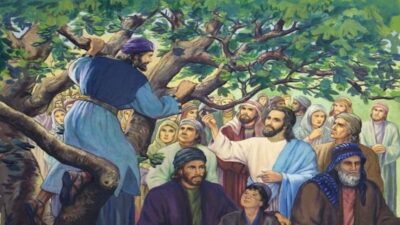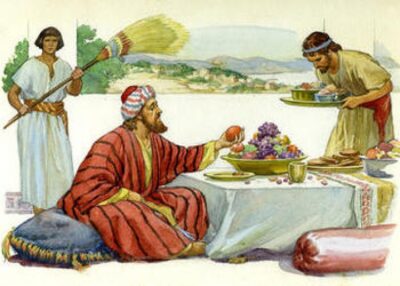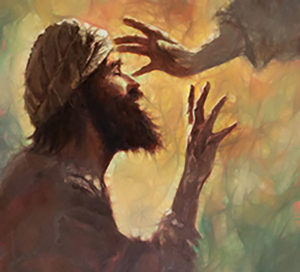February 26, 2023
|by N W
|
0 Comments
|
Courage, Deacon Mark, Faith, Grace, Humility, Lent, Scripture, Sin, Strength, Trust
First Sunday of Lent
February 26, 2023 — Year A
Readings: Gn 2:7-9; 3:1-7 / Ps 51 / Rom 5:12-19 / Mt 4:1-11
by Rev. Mr. Mark De La Hunt, Permanent Deacon
Lent can present us with seemingly impossible odds of success. Be transformed in holiness in forty days despite being surrounded by temptation, working or going to school or both, raising kids, fighting chronic illness or pain, being distant from God or lukewarm in our faith, and struggling with any number of vices or addictions. One might say that entering into Lent is like setting sail on a perilous voyage.
For this metaphor, the story of the intrepid British explorer, Ernest Shackleton, comes to mind. His famous voyage to Antarctica took place from 1915 to 1916. He and his crew were faced with nearly impossible odds of survival. His ship, the Endurance, was made of wood. The ice trapped it and then broke and sank it, leaving the crew in lifeboats. No one else knew they were in trouble, for they had no radio nor phone back then.
Death could snatch their lives in any number of ways including freezing, starving, or drowning. They ended up making their way to a tiny island off Antarctica. Shackleton and five others left the crew there to go get help. They sailed by the stars over eight hundred miles in an open lifeboat, to try to get to a remote, South Georgia whaling island. If they missed it, they would run out of supplies and die, as would their crew back in Antarctica. Each day their routines kept them alive and brought a little hope, but as the days dragged on, doubt crept back. And not just of surviving, but of being heroes and transformed men. We will finish their story later, but for now let’s apply their plight to our 2023 Lent.
There was a recruiting poster for Shackleton’s voyage that read more like something to run from than to sign up for. “Men wanted for hazardous journey. Low wages, bitter cold, long hours of complete darkness. Safe return doubtful. Honour and recognition in event of success.” Imagine if we had a recruiting poster for Lent. What would be on it?
It could read something like this, “Men and women wanted for a spiritual journey. No wages, facing your weaknesses, confessing your sins, long hours of prayer, fasting, and almsgiving. Returning unchanged…doubtful. Increased peace and holiness in event of success. Remember that you are dust and to dust you shall return.” Maybe it is not as ominous as the Shackleton poster, but it is not exactly a picnic either.
And yet, just as Shackleton’s poster filled his ship with crew members, so too does Jesus’ Lenten invitation seem to fill Catholic churches on Ash Wednesdays. God made us to desire and seek out challenges that will transform us into a better person, so off we set sail on our Lenten voyage with an ashen cross on our foreheads.
Mondays through Saturdays during a good Lent can be rough at times. Knowing that where we are is not the best place we can be, no matter how good we may think it is, we go about our daily Lenten routine religiously. We pray extra with the daily Lenten readings on the USCCB website and with our Catholic apps like Hallow, iBreviary, and Laudate. We fast daily by practicing the virtue of temperance…no snacking between meals, less phone time, less gaming, less TV, less coffee… And we increase our acts of love using the grace from God’s word and the extra prayer and by making good use of the time freed up by abstaining from or minimizing non-essential things.
If you really go for it, if you really try to allow God to form you more into the person He created you to be, the person that will feel whole and at peace, then you will come to each Sunday needing healing and hope like Shackleton’s crew left behind on the island. Lenten Sundays are like repair and restocking islands along our Lenten voyage. Why? Because there is a good chance you will have a wounded ego, having stumbled in your Lenten promises. Good! Catholic author and scholar Mark Searle wrote, “Lenten penance may be more effective if we fail in our resolutions than if we succeed, for its purpose is not to confirm us in our virtue but to bring home to us our radical need for salvation (Ordo 68).”
In today’s gospel reading, we see Jesus, without using His divine power, overcome the same temptations with which Satan conquered Adam and Eve. Jesus uses God’s word and His faith in it. We can, too. The Church has set us up with the right scriptures. Read the daily readings daily. They prepare you to more fully receive the grace of the Sunday readings.
Here is what I am talking about. Next Sunday, the Second Sunday of Lent, possibly having stumbled, we will be encouraged by getting a sneak peek at the glory we are striving for in Lent, as we gaze upon Jesus’ glory in the Transfiguration with Peter, James, and John. On the third Sunday, when our water rations are running low, we stop at a water well and listen in on the conversation between the lonely Samaritan woman and Jesus. Her encounter with Him restores her relationships in town, heals her interior wounds, and gives her life new purpose. The fourth Sunday, when we are losing our way in the dark and rough seas, we witness Jesus open the eyes of the man “blind from birth (Jn 9:1).” By the fifth Sunday, we are really wearing down and think we cannot go on. We start to lose hope of changing until we behold Jesus calling Lazarus to come out of his tomb, from death to new life.
These stories are like when Shackleton, dying of thirst and cold on his eight-hundred-mile lifeboat voyage, saw kelp and sea birds and realized that, though he could not see it, land and help were not far away. The sixth Sunday we see palm branches and know our journey is nearing its end; it is Palm Sunday, and the Resurrection is only a week away.
The daily readings the first few weeks of Lent are meant to remind us that we are sinners that need a savior. Mark Searle points out that in the second half of Lent the readings shift from a focus on our weakness to the power of Christ to heal and to renew our lives.
What is your destination this Lent? What is the conversion Jesus is calling you to this year? What ominous, threatening invitation was on your recruiting poster on Ash Wednesday?
In today’s first reading, Eve looked at that forbidden fruit and saw that it was “pleasing to the eyes and desirable (Gn 3:6).” What forbidden fruit have you given in to? Maybe Jesus is calling you to research the Church’s teaching on a moral issue with which you disagree or have given up on such as divorce, fidelity in marriage, pornography, abortion, capital punishment, gay marriage, gender dysphoria, or schools teaching kids worldly morality? These are tough issues confronting all of us. Learn why the Church stands opposed to the world on these issues. She is our mother, and she has the wisdom of two thousand years of battling against sin under the guidance of the Holy Spirit.
King David tried the forbidden fruit. Despite being his nation’s leader and above the law, when he committed the sins of adultery and murder, his life took a turn for the worse. David realized his sin because a friend pointed it out to him. His subsequent confession and recognition of God’s mercy is today’s Psalm 51.
A good daily Lenten routine would be to pray David’s words and make them your own, “My sin is before me always…Against you only have I sinned…A clean heart create for me, O God, and a steadfast spirit renew within me.” Jesus answers that prayer through the sacraments of baptism, confirmation, confession, and Holy Communion. In baptism and confirmation, He gave us a new heart and a steadfast spirit; His heart and His spirit. In confession and Holy Communion, He renews them within us.
What happened to Shackleton’s crew, left stranded on that tiny island off Antarctica? For their daily routine, to keep them from the despair of the seemingly impossible odds and to make sure they were ready when the time for rescue came, they broke camp every day and packed to be ready to board the rescue ship. However, days turned into weeks and weeks turned into months. And 105 days later, when they were thinking the daily routine was a waste of time, their captain appeared on a rescue ship and called out, “Are you all well?” And the crew called back, “All safe, all well!” Not a single crew member died.
While struggling to survive and to avoid falling into despair, the crew was not aware of all their captain was going through to save them. They were not aware of what he would endure and overcome out of loyalty to them. He sailed across eight hundred miles of freezing ocean in an open boat. Climbed a frozen mountain despite suffering from frost bite, skin ravaged by constantly wet clothing, and a tongue swollen from a lack of fresh water. He climbed down a freezing waterfall and crawled across cracking ice on a frozen lake. And astoundingly, did not stop to rest when he found shelter, food, and water, but set sail the very next day to go get his crew. He had to make four attempts to get to them, turned back by ice and other obstacles three times. On the fourth try he returned and saved them.
You know where I am going with this. Shackleton was just a man and he saved his whole crew against seemingly impossible odds. Jesus is God, infinitely powerful. He is our captain. How much more so can He help us overcome our weaknesses this Lent?
Here is how you succeed. Imitate Shackleton’s crew. Keep your daily routine and when you fail, start it again the very next day. Have a crewmate or accountability partner and touch base daily. Use the daily readings and prayer to remind you what Jesus is doing while you struggle through Lent. He did not abandon us. He literally suffered, died, and went to hell and back for us. Our captain is with us every day as we pray, fast, and love. And when we fail even in sometimes shameful ways, He is shoulder to shoulder with us. He knows what temptation is like. He knows what feeling God-forsaken and lost is like.
He does not just show us the way to personal transformation. He IS the way. He IS our north star. The crucifix is our Lenten voyage compass, always pointing to heaven through our voluntary and involuntary suffering. Cajun priest, author, and spiritual director Fr. Mark Toups sums up Lent well and I am paraphrasing here. He wrote, “Remember that Lent is not about you. It is about Jesus. He is the one who wants this Lent to be transformational for you. Lent is not about what you are doing. It is about what God is doing with what you are doing for Lent. It is not so much about checking off a list of things you achieved during Lent, but about those things helping set you up for a life-changing, personal encounter with Jesus Christ like Peter, James, and John at the Transfiguration, the Samaritan woman at the well, and Lazarus in his tomb (13).”
This coming Easter Vigil when our Captain calls out, “Are you all well?” May we all be able to respond, “We are safe and well, my Lord.” Amen.
Citations
Diocese of Richmond. Ordo – Order of Prayer in the Liturgy of the Hours and Celebration of the Eucharist 2023. Paulist Press 2022.
Peter Kreeft. Food for the Soul – Reflections on the Mass Readings for Cycle A. Word of Fire 2022.
Fr. Mark Toups. Lenten Companion, A Personal Encounter with the Power of the Gospel. Ascension Publishing 2023.
KEEP READING
 540-586-8988
540-586-8988 










